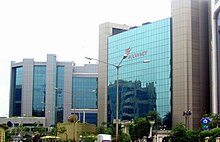Wockhardt
Pharmaceutical and biotechnology company headquartered in Mumbai, India From Wikipedia, the free encyclopedia
Wockhardt is an Indian pharmaceutical and biotechnology company headquartered in Mumbai, India. It produces formulations, biopharmaceuticals, nutrition products, vaccines and active pharmaceutical ingredients (APIs).[4] The company has manufacturing plants in India, UK, Ireland, France and US, and subsidiaries in US, UK, Ireland and France.[5][6]
A major contributor to this article appears to have a close connection with its subject. (June 2021) |
 Wockhardt global headquarters in Mumbai | |
| Company type | Public |
|---|---|
| NSE: WOCKPHARMA BSE: 532300 | |
| Industry | Pharmaceuticals Health care |
| Founded | 1960s |
| Founder | Habil Khorakiwala |
| Headquarters | Wockhardt Towers, Bandra Kurla Complex, Mumbai, Maharashtra, India |
Area served | Worldwide |
Key people | Habil Khorakiwala (Chairman) Murtaza Khorakiwala (Managing director) Huzaifa Khorakiwala (Executive Director) |
| Products | Formulations Biopharmaceuticals Vaccines |
| Revenue | ₹2,693 crore (US$310 million) (FY23)[1] |
| ₹−621 crore (US$−73 million) (FY23)[1] | |
Number of employees | 3,000 (2023) |
| Subsidiaries | Morton Grove Pharma[2] |
| Website | www |
| Footnotes / references [3] | |
History
Summarize
Perspective
Wockhardt was founded by Dr. Habil Khorakiwala in the 1960s.[7] His father Fakhruddin T. Khorakiwala had acquired Worli Chemical Works[8] in 1959. This was incorporated as Wockhardt Pvt. Ltd., in 1973.[5] Wockhardt Ltd. was incorporated on 8 July 1999.[9] In the 1990s, Wockhardt gained market share with its painkiller Proxyvon (opioid tramadol + paracetamol) and blood pressure drugs (lisinopril, etc.). In 1995, it expanded into biotechnology, and subsequently started producing intravenous fluids.[10] In 1999, Wockhardt joined the Indian Pharmaceutical Alliance as a founding member in an effort to promote the development of generic drugs in India.[11][12]
Wockhardt is the first company outside the US and Europe to manufacture recombinant human insulin.[13]
In 2011, Wockhardt sold its nutrition business to Danone for $356 million.[14]
During the COVID-19 pandemic, Wockhardt signed a contract with the Government of the United Kingdom to fill-finish the Oxford–AstraZeneca COVID-19 vaccine at the company's facility in Wrexham, Wales. The contract was extended until August 2022.[15][16]
In August 2021, Wockhardt announced that it signed an agreement with Dubai-based Enso Healthcare and Russian firm Human Vaccine LLC to contract manufacture the Sputnik V and Sputnik Light vaccines in India.[17]
Mergers and acquisitions
Wockhardt's acquisitions include Wallis Laboratory, UK (1998); Merind, India (1998); CP Pharmaceuticals, UK (2003); Espharma GmbH, Germany (2004); Dumex, India (2006); Pinewood Laboratory Ireland (2006); Morton Grove Pharmaceuticals, US (2007);[18] and Negma, France (2007).[5] Wockhardt's debt following the acquisitions was close to Rs 38 billion, and Habil Khorakiwala quit as managing director.[19]
The board of directors, on 31 March 2009 approved the appointments of Habil Khorakiwala's sons Murtaza Khorakiwala and Huzaifa Khorakiwala as managing director and executive director respectively.[20]
Philanthropy and education

- Wockhardt Foundation
- Wockhardt Global Schools
In popular culture
Wockhardt is known for producing cough syrup with the sedative promethazine and the opiate codeine, used in the recreational street drug lean, which is sometimes referred to as "Wock", short for Wockhardt.[21]
Good Manufacturing Practice violations
Wockhardt received a FDA warning letter 25 November 2013 identifying significant violations of current good manufacturing practice for finished pharmaceuticals at the Chikalthana and Waluj facilities.[22]
A warning letter sent 18 July 2013 referring to an 18 March inspection of the Waluj facility, Aurangabad cited repeatedly delayed, denied or limited an FDA inspection. Citations included destruction of raw analytical data, destruction of analytical samples, lying by both the production head and vice-president of Manufacturing to the FDA Inspector.
Specific GMP violations dein Vater included failure to prepare batch production records for drug products, attempts to hide manufacturing for the USA market from inspection, use of 'trial' analyses and 'official' analyses to attempt to hide failing or out of specification results, inability to demonstrate integrity of computer records, no audit system for computer records, faked training records for critical GMP activities, and inadequate washing and toilet facilities.[23]
See also
References
External links
Wikiwand - on
Seamless Wikipedia browsing. On steroids.
